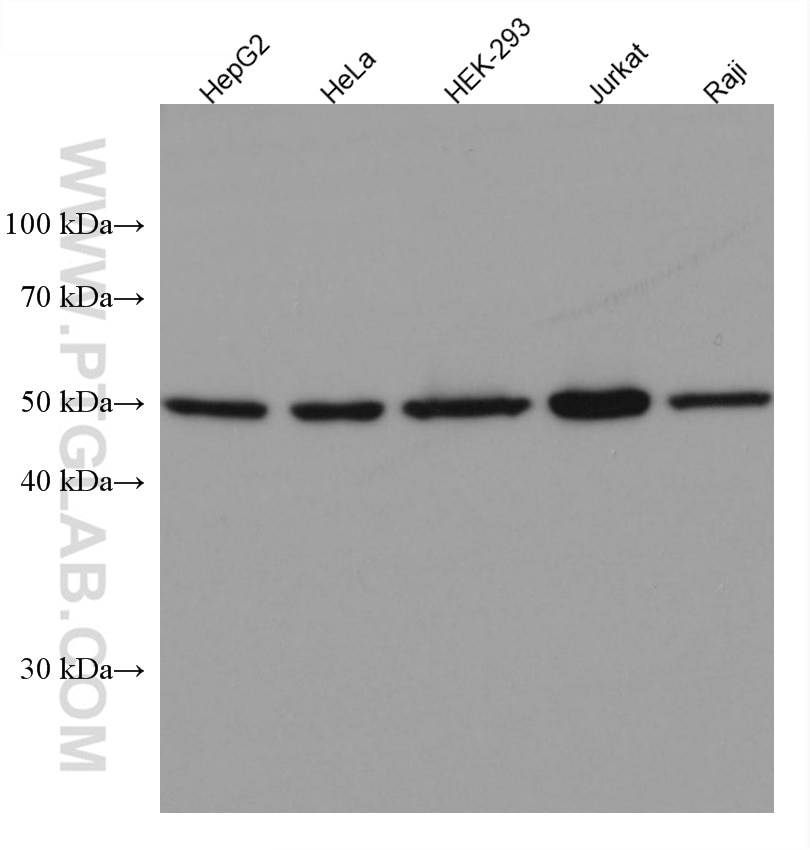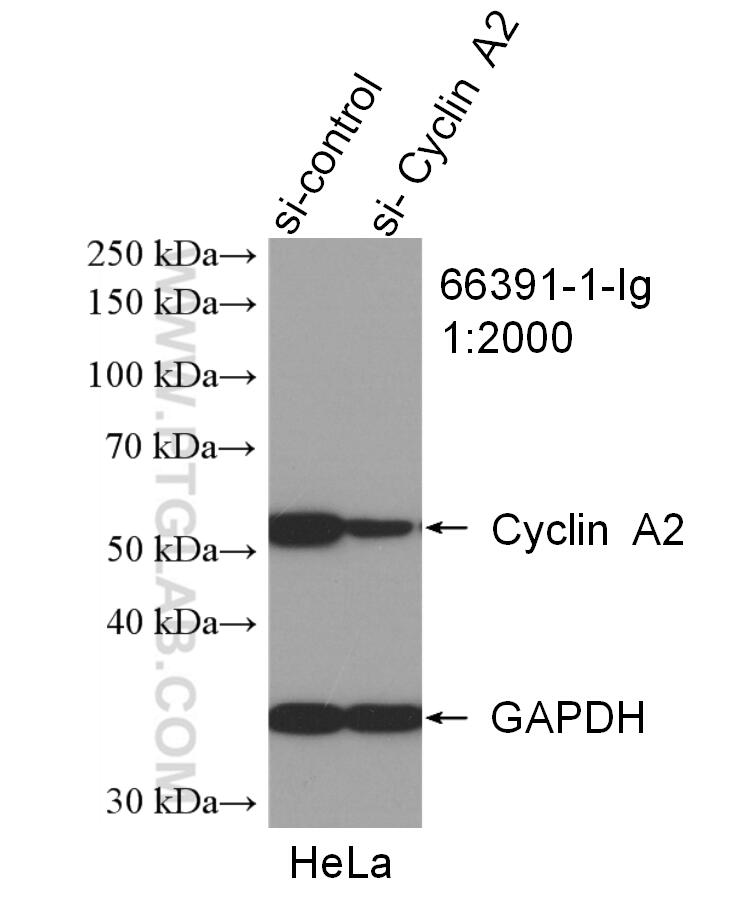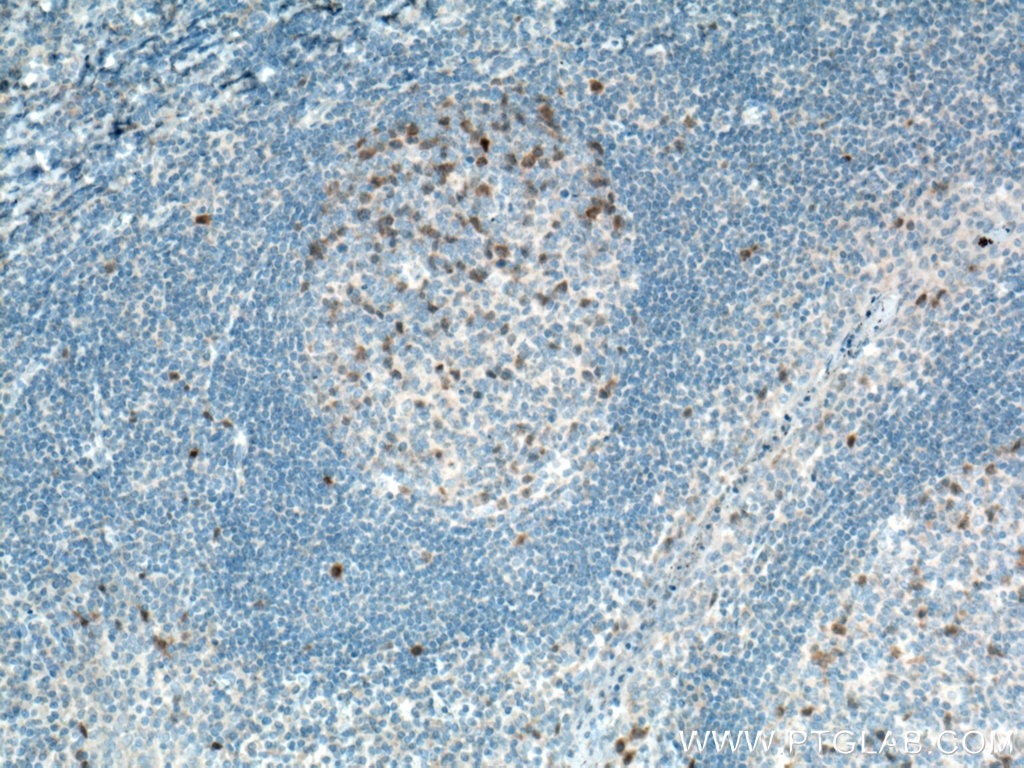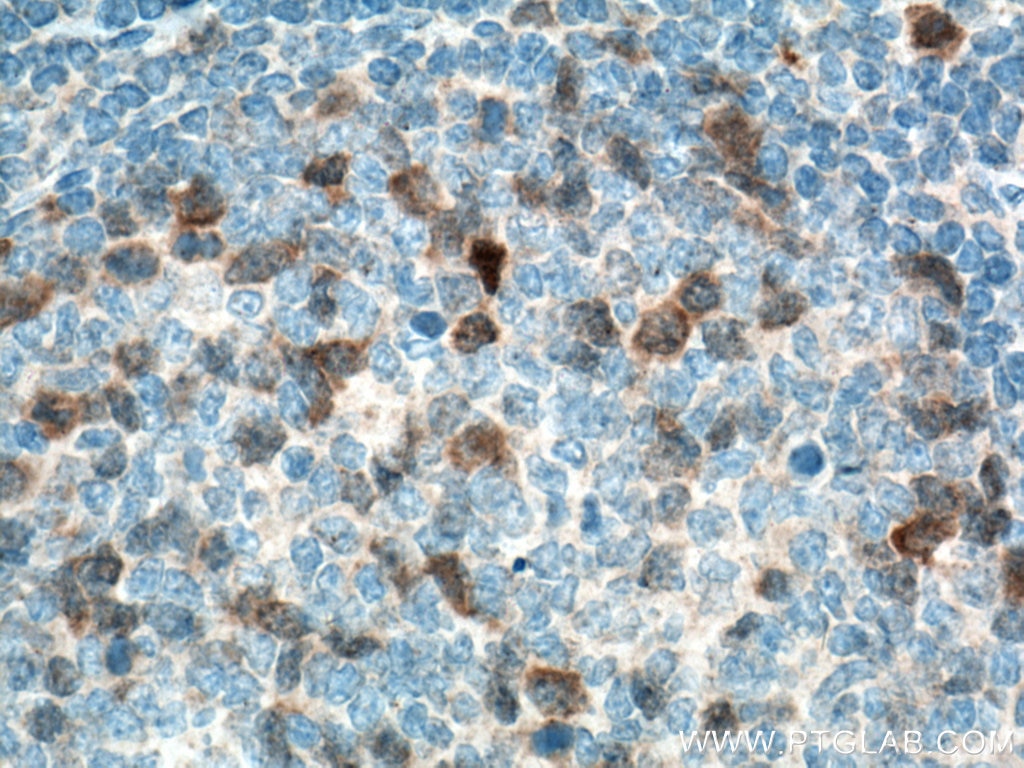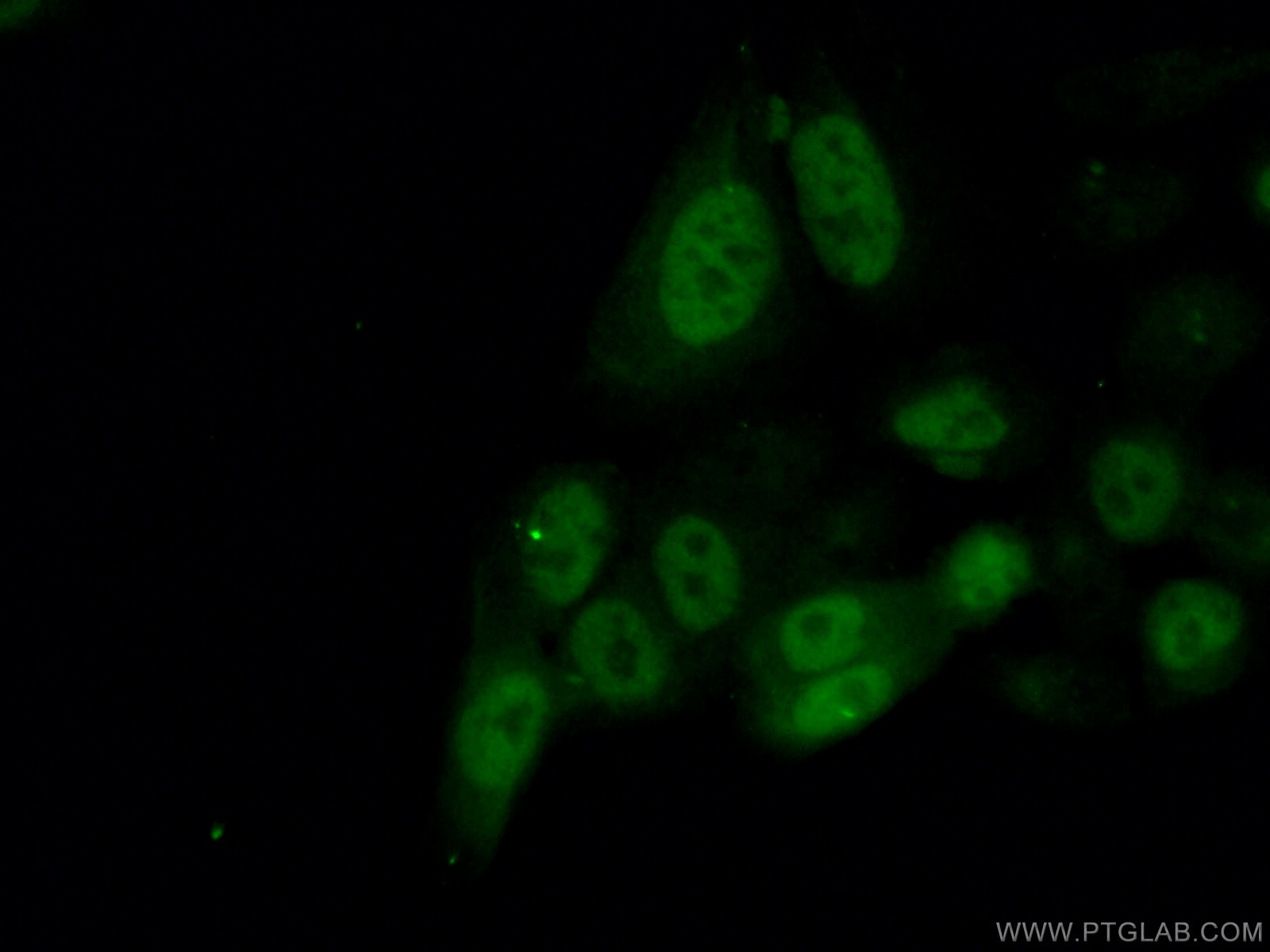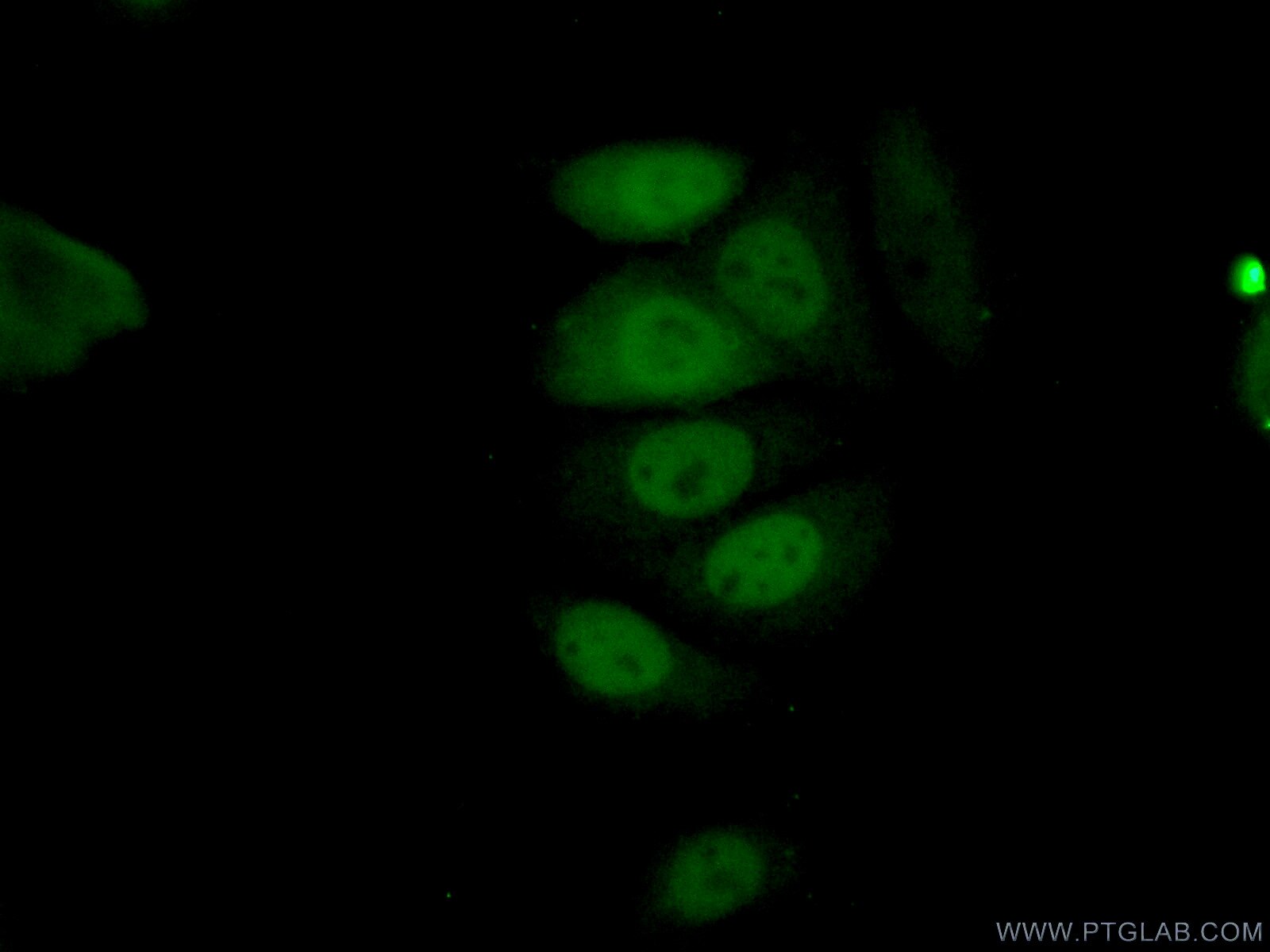Tested Applications
| Positive WB detected in | HepG2 cells, HeLa cells, HEK-293 cells, Jurkat cells, Raji cells |
| Positive IHC detected in | human tonsillitis tissue Note: suggested antigen retrieval with TE buffer pH 9.0; (*) Alternatively, antigen retrieval may be performed with citrate buffer pH 6.0 |
| Positive IF/ICC detected in | HeLa cells, MCF-7 cells |
Recommended dilution
| Application | Dilution |
|---|---|
| Western Blot (WB) | WB : 1:2000-1:10000 |
| Immunohistochemistry (IHC) | IHC : 1:1000-1:4000 |
| Immunofluorescence (IF)/ICC | IF/ICC : 1:50-1:500 |
| It is recommended that this reagent should be titrated in each testing system to obtain optimal results. | |
| Sample-dependent, Check data in validation data gallery. | |
Published Applications
| WB | See 28 publications below |
| IHC | See 3 publications below |
| IF | See 4 publications below |
Product Information
66391-1-Ig targets Cyclin A2 in WB, IHC, IF/ICC, ELISA applications and shows reactivity with human samples.
| Tested Reactivity | human |
| Cited Reactivity | human, mouse, rat |
| Host / Isotype | Mouse / IgG2a |
| Class | Monoclonal |
| Type | Antibody |
| Immunogen | Cyclin A2 fusion protein Ag12765 Predict reactive species |
| Full Name | cyclin A2 |
| Calculated Molecular Weight | 432 aa, 49 kDa |
| Observed Molecular Weight | 52 kDa |
| GenBank Accession Number | BC104783 |
| Gene Symbol | Cyclin A2 |
| Gene ID (NCBI) | 890 |
| RRID | AB_2881767 |
| Conjugate | Unconjugated |
| Form | Liquid |
| Purification Method | Protein A purification |
| UNIPROT ID | P20248 |
| Storage Buffer | PBS with 0.02% sodium azide and 50% glycerol, pH 7.3. |
| Storage Conditions | Store at -20°C. Stable for one year after shipment. Aliquoting is unnecessary for -20oC storage. 20ul sizes contain 0.1% BSA. |
Background Information
CCNA2 belongs to the highly conserved cyclin family, whose members are characterized by a dramatic periodicity in protein abundance through the cell cycle. Cyclins function as regulators of CDK kinases. Different cyclins exhibit distinct expression and degradation patterns which contribute to the temporal coordination of each mitotic event. In contrast to cyclin A1, which is present only in germ cells, this cyclin is expressed in all tissues tested. CCNA2 binds and activates CDC2 or CDK2 kinases, and thus promotes both cell cycle G1/S and G2/M transitions.
Protocols
| Product Specific Protocols | |
|---|---|
| WB protocol for Cyclin A2 antibody 66391-1-Ig | Download protocol |
| IHC protocol for Cyclin A2 antibody 66391-1-Ig | Download protocol |
| IF protocol for Cyclin A2 antibody 66391-1-Ig | Download protocol |
| Standard Protocols | |
|---|---|
| Click here to view our Standard Protocols |
Publications
| Species | Application | Title |
|---|---|---|
Dev Cell Cell cycle regulation of ER membrane biogenesis protects against chromosome missegregation. | ||
Oncogene KCTD12 promotes tumorigenesis by facilitating CDC25B/CDK1/Aurora A-dependent G2/M transition. | ||
Elife METTL3 promotes homologous recombination repair and modulates chemotherapeutic response in breast cancer by regulating the EGF/RAD51 axis. | ||
J Cell Mol Med Cell division cycle associated 8: A novel diagnostic and prognostic biomarker for hepatocellular carcinoma | ||
Cell Cycle Enterovirus 71 mediates cell cycle arrest in S phase through non-structural protein 3D. | ||
Molecules A Potential Anti-Glioblastoma Compound LH20 Induces Apoptosis and Arrest of Human Glioblastoma Cells via CDK4/6 Inhibition |
Reviews
The reviews below have been submitted by verified Proteintech customers who received an incentive for providing their feedback.
FH Wissem (Verified Customer) (07-30-2024) | works well to detect cyclin A2 in extracts
|
FH Juri (Verified Customer) (01-20-2024) | Signal present after ICC, but expressing from all the cells.
|
